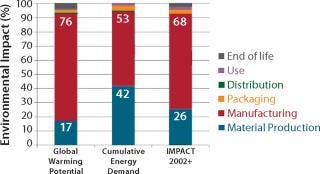Sustainability and Corporate ResponsibilitySustainability and Corporate Responsibility
July 1, 2010

As the adoption of single-use products continues to grow at a very fast pace in the biopharmaceutical industry, customers and suppliers are becoming increasingly aware of the potential impact of these products on the net environmental footprint of operations. At Millipore, a key goal is to design and manufacture products with the lowest carbon and water footprints possible and to ensure that these products are managed in the most environmentally friendly way.
Millipore’s sustainability vision calls for the company’s operations to become environmentally sustainable in the long-term by dramatically reducing the consumption of nonrenewable resources, reducing waste, and adopting behavioral changes that support sustainability companywide. The multiprong sustainability approach includes specific initiatives focusing on climate and energy, waste, water, employees and communication, and product packaging.
These are challenging goals as our business has grown, but we have already made a great deal of progress since 2006, with achievements that include a 15% reduction in greenhouse gases (GHGs); an 11% decrease in global energy use; and a 22% reduction in global water use. Over the next few years, our focus will be on quantifying life cycle environmental impacts of single-use systems, identifying the primary drivers of the environmental impacts, and developing specific, measurable strategies to reduce environmental impacts.
Life Cycle Analysis: Understanding the Product from Cradle to Grave
We need a precise understanding of baseline impacts before we can move full steam ahead to reduce them. to get this fine-grained understanding, we conducted a complete quantitative life cycle assessment (LCA) of a typical single-use assembly, using a Mobius® 1,000-L buffer/media filtration system as the sample unit. The LCA considered all aspects of the product, including material production, manufacturing, packaging, distribution, use, and end of life (disposal/recycling).
Figure 1 shows the environmental impact of the sample Mobius system’s complete life cycle for three metrics commonly used in measuring environmental impacts of products:
global warming potential (GWP), a measure of how much a given mass of greenhouse gas is estimated to contribute to global warming
cumulative energy demand, the sum total of all primary energy used to manufacture a product
the Life Cycle Impact Assessment (LCIA) toxicity model, (impact 2002), which provides characterization factors for human toxicity, and aquatic and terrestrial ecotoxicity.

Figure 1: ()
We were aware that single-use products use less energy, water for injection (WFI), steam, and cleaning chemicals than do their stainless steel counterparts. But our LCA analysis resulted in a number of surprises, the biggest of which is that material production, manufacturing, and (to a lesser degree) distribution of single-use assemblies to end users can have a significantly larger carbon footprint than disposal. This dispels the commonly held notion that the most serious issue facing the single-use industry is waste disposal.
An LCA is only as good as what we do with the data. Millipore has embarked upon numerous projects to reduce the carbon footprint of various critical steps highlighted by the Mobius LCA. For example, manufacturing is by far the largest contributor to environmental impact (76% of GWP). Building redesign based on LEED guidelines and manufacturing process improvements in Danvers, MA should result in up to 53% reduction in the carbon footprint from the “manufacturing” step. Millipore is also investing in a long-term engineering solution for filter integrity testing that, combined with the above mentioned manufacturing sustainability initiatives, should result in an overall 61% reduction in the carbon footprint contributed during the product life cycle.
Developing sustainable single-use products is a journey for us. Toward that goal, Millipore continues to investigate opportunities in all other areas of the Mobius LCA such as material production (scrap reduction), distribution (mode of transportation, shipping efficiency), and end of life (low-impact disposal or recycling of disposables technologies).
About the Author
Author Details
Vikas Gupta is group product manager for Mobius® single-use products and services at Millipore Corporation, 290 Concord Road, Billerica, MA 01821; 1-800-645-5476; www.millipore.com.
You May Also Like






